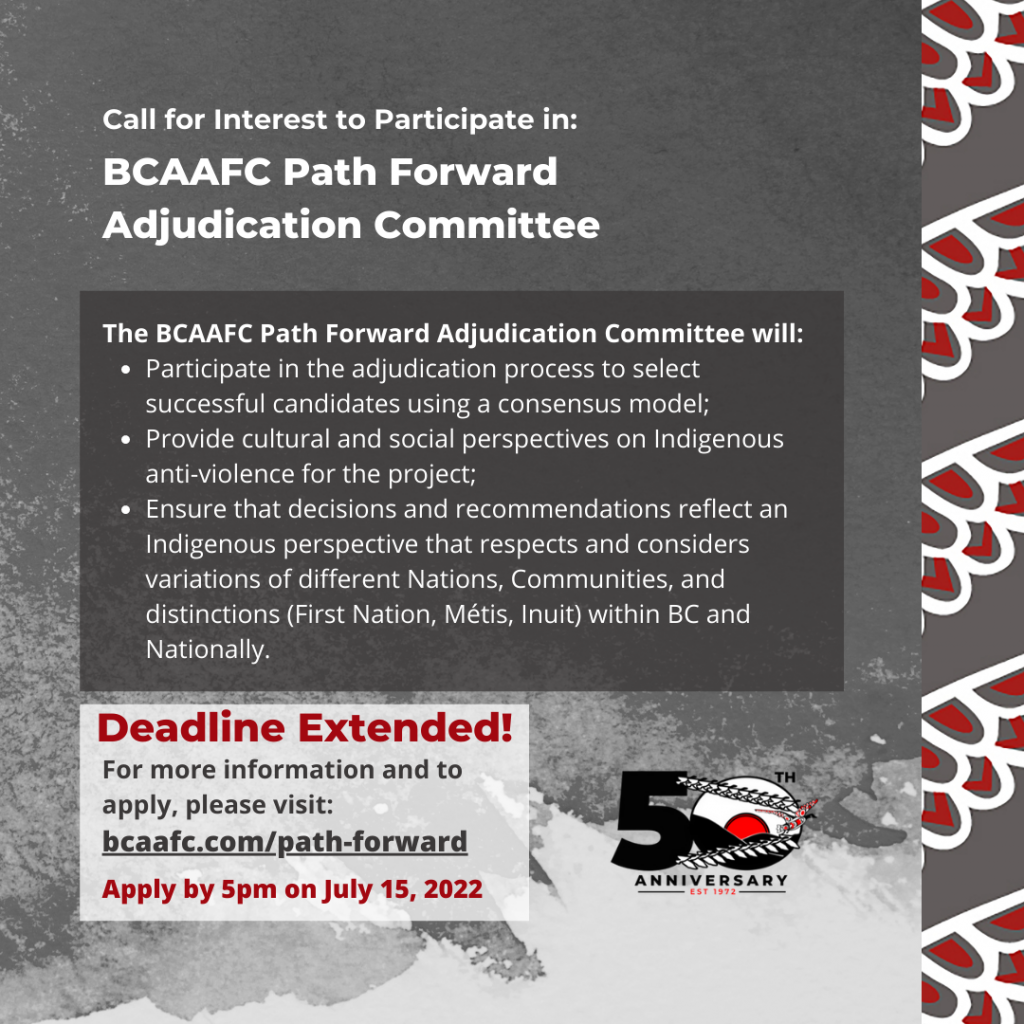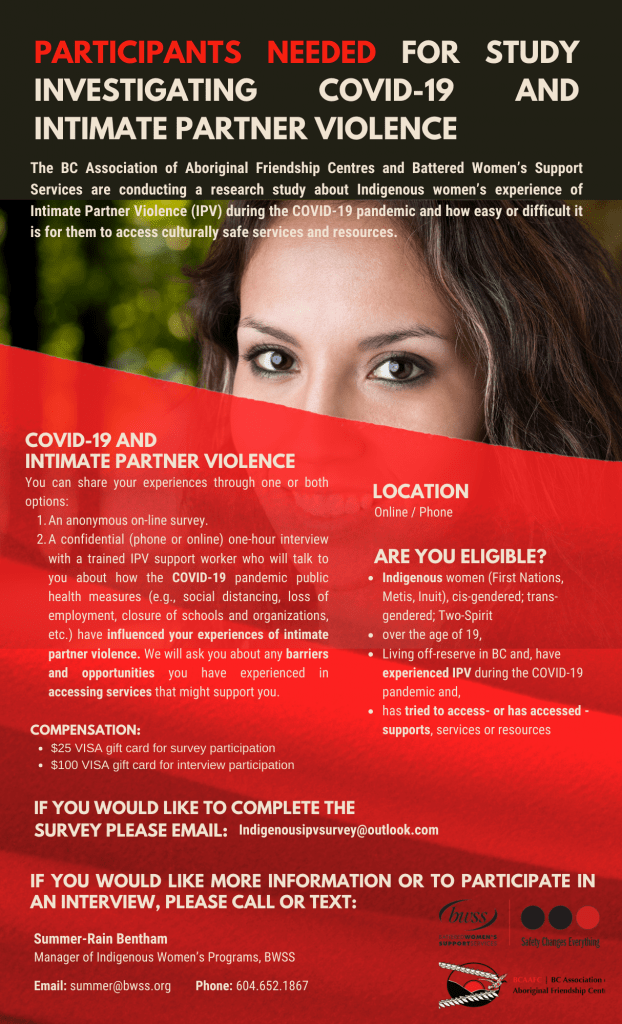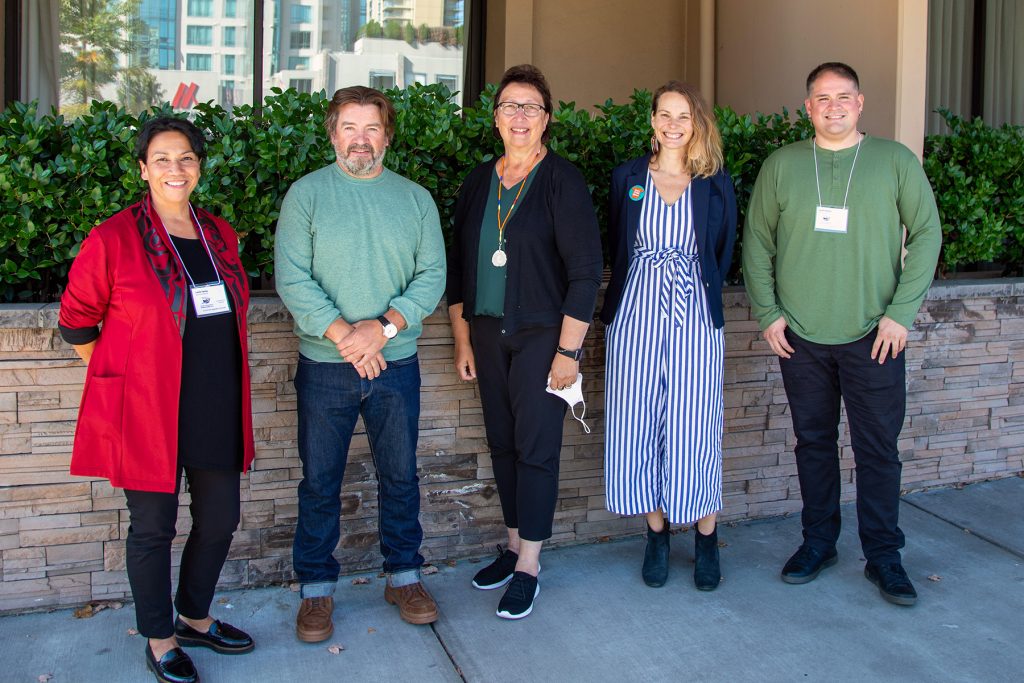


May 2, 2022
We acknowledge the Songhees, Esquimalt and WSÁNEĆ peoples, the traditional keepers of this land, for allowing us to work, play, and reside on their traditional and unceded territory.
BCAAFC is happy to have been part of the process in informing the B.C. Anti-Racism Data Act. BCAAFC hosted engagement sessions where representatives from B.C. Friendship Centres shared concerns, frustrations, as well as appreciation associated with the data collection process. Our hope is that this legislation will operate in a way that compliments the important work Friendship Centres do and helps to establish a consistent way to gather data that provides a respectful, strengths-based understanding of Indigenous communities, so Friendship Centres can continue to be responsive in meaningful ways.
We look forward to continuing a conversation with the B.C. government in the implementation of this legislation.
Thank you to BC Friendship Centres who took part in the engagement sessions that informed this legislation. To read the BCAAFC Anti-Racism Data Legislation Friendship Centre Consultation report, visit: https://engage.gov.bc.ca/app/uploads/sites/658/2022/04/BCAAFC-Anti-racism-Engagement-Report.pdf
April 11, 2022
We acknowledge the Songhees, Esquimalt and WSÁNEĆ peoples, the traditional keepers of this land, for allowing us to work, play, and reside on their traditional and unceded territory.
BCAAFC is excited to develop and administer the Path Forward Community Fund, part of B.C.’s plan to end violence against Indigenous women, girls and 2SLGBTQ+ people. BCAAFC will manage the $5.34-million fund to help Indigenous communities and organizations expand safety planning capacity. Eligible projects include support for hosting planning sessions, culturally appropriate safety training as well as healing and cultural supports.
“BC Friendship Centres play a critical and direct role at a grassroots level in eradicating pervasive, systemic violence against Indigenous women, girls and 2SLGBTQ+ people. It’s inspiring to work with safety advocates empowering their communities. We look forward to continuing this important work in investing in community resilience, self-determination and reconciliation,” said BCAAFC Executive Director Leslie Varley.
For more information on the release, visit: https://news.gov.bc.ca/releases/2022PSSG0028-000543
March 30, 2022
We acknowledge the Songhees, Esquimalt and WSÁNEĆ peoples, the traditional keepers of this land, for allowing us to work, play, and reside on their traditional and unceded territory.
BCAAFC is pleased to support the Action Plan of the Declaration on the Rights of Indigenous Peoples Act. This government-wide initiative unanimously supported by all parties and focused on action will benefit all British Columbians. The Action plan is a clear step towards genuine implementation of human rights and equitable access to services for Indigenous people. BCAAFC looks forward to assisting the Province and Indigenous groups to end Indigenous-specific racism and discrimination, and to begin contributing to the social, cultural and economic well-being of Indigenous people.
“We hope this action plan will help to dismantle some of the colonial structures that have had devastating effects on our lives and cultures.” – Dr. Sharon McIvor, BCAAFC President.
For more information, visit: https://news.gov.bc.ca/releases/2022SDPR0015-000420
Watch recording of today’s funding announcement:
March 24, 2022
We acknowledge the Songhees, Esquimalt and WSÁNEĆ peoples, the traditional keepers of this land, for allowing us to work, play, and reside on their traditional and unceded territory.
BCAAFC welcomes today’s news of a $34-million Recovery and Resiliency Fund for non-profit groups in the province, which includes $5 million specifically allocated to Indigenous-led organizations.
There are 25 Friendship Centres that deliver crucial programs and services to the estimated 85% of Indigenous people in B.C. that live off-reserve or in urban areas. With higher service costs and more demand on BC Friendship Centres due to the pandemic and recent environmental disasters, we applaud this announcement and look forward to more details and engagement with government partners on administering these funds in the near future.
For more information, visit: https://news.gov.bc.ca/releases/2022SDPR0015-000420
Watch recording of today’s funding announcement:

For Immediate Release
February 24, 2022
Traditional and unceded territory of the Sḵwx̱wú7mesh Nation (West Vancouver BC) and Coast Salish Territory of the Lekwungen and W̱SÁNEĆ nations, (Victoria, BC) – The Aboriginal Housing Management Association (AHMA) and BC Association of Aboriginal Friendship Centres (BCAAFC) support the integral steps towards reconciliation found within BC Budget 2022. However, the budget falls short on priorities for both Indigenous women and urban, rural and northern Indigenous housing.
Approximately 85% of all Indigenous Peoples in B.C. live off-reserve in towns and cities and continue to be excluded from distinction-based funding. AHMA and BCAAFC call on the provincial government to expand their commitment to reconciliation by addressing the substandard living conditions and lack of social supports that Indigenous peoples endure throughout B.C.
Indigenous Women
BCAAFC is particularly concerned that Indigenous women have been the hardest hit financially due to the pandemic. “We see a large shortage of women in the workforce, especially trained childcare workers. Many Indigenous women have fallen out of the workforce because of inaccessible childcare, transportation, and the cost of working being only marginally more financially viable than staying home to look after family. It is disappointing that these issues are not addressed in this budget.” said Leslie Varley, Executive Director of the BC Association of Aboriginal Friendship Centres.
Furthermore, Indigenous women have experienced violence at a disproportionate level throughout the pandemic. It is of grave concern that no concrete measures within this budget ensure culturally safe and supportive services to address violence against Indigenous women.
Housing Priorities
“The budget lacks the specific means and measures needed to address the growing housing issues experienced by Indigenous people residing in rural, urban, and northern communities,” said Margaret Pfoh, Chief Executive Officer of AHMA. “AHMA released B.C.’s first ever provincial Urban, Rural and Northern Indigenous Housing Strategy and we’re calling on our government to support and implement our strategy to ensure all Indigenous peoples can access culturally safe and affordable housing.”
AHMA and BCAAFC call on the Government of British Columbia to work with Indigenous partners to better understand the lived reality of off-reserve populations in B.C. Only through meaningful engagement with Indigenous organizations and service providers can the social, economic, and Indigenous rights of urban and rural Indigenous peoples in British Columbia be claimed and protected in relation to the Truth and Reconciliation Commission and Indigenous self-determination rights per the United Nations Declaration on the Rights of Indigenous Peoples.
Indigenous funding highlights from the 2022 BC Budget:
-30-
Media Contacts
AHMA Communications Manager, Laurie Brownrigg
BCAAFC Communications Officer, David Murphy

